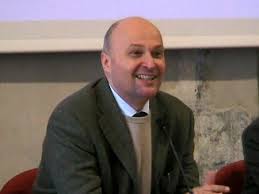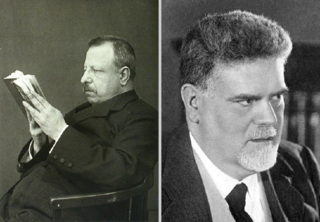Related Research Articles

Emanuele Severino was an Italian philosopher.
Carlo Penco is an Italian analytic philosopher and full professor in philosophy of language at the University of Genoa in Italy.
Ludovico Geymonat was an Italian mathematician, philosopher and historian of science. As a philosopher, he mainly dealt with philosophy of science, epistemology and Marxist philosophy, in which he gave an original turn to dialectical materialism.
Giorgio Bàrberi Squarotti was an Italian academic, literary critic and poet. He taught at the University of Turin from 1967 until his death in 2017. He was considered to be one of the most important literary critics of his time.
Pieranna Garavaso is an analytic philosopher and professor emerita at the University of Minnesota Morris. Her areas of interest include epistemological and metaphysical issues in philosophy of mathematics, philosophy of language, Ludwig Wittgenstein, Gottlob Frege, Bertrand Russell, and feminist epistemology. She received her doctorate in philosophy from the University of Nebraska, Lincoln. She is the recipient of two distinguished teaching awards: the University of Minnesota, Morris Alumni Association Teaching Award in 2003 and the Horace T. Morse University of Minnesota Alumni in 2004.

Roberto Esposito is an Italian political philosopher, critical theorist, and professor, notable for his academic research and works on biopolitics. He currently serves as professor of theoretical philosophy at the Scuola Normale Superiore in Pisa.

Augusto Ponzio is an Italian semiologist and philosopher.

Giovanni Reale was an Italian historian of philosophy.

Antonio Banfi was an Italian philosopher and senator. He is also noted for founding the Italian philosophical school called critical rationalism.

Giuseppe Di Giacomo is an Italian philosopher and essayist.

Mauro Ceruti is an Italian philosopher.
Arrigo Pacchi was an Italian historian of philosophy. He graduated in philosophy at the University of Milan with an academic thesis in Medieval Philosophy. He dedicated his studies in particular to the natural philosophy of Thomas Hobbes and to the influence of Cartesianism in England.

Italian idealism, born from interest in the German movement and particularly in Hegelian doctrine, developed in Italy starting from the spiritualism of the nineteenth-century Risorgimento tradition, and culminated in the first half of the twentieth century in its two greatest exponents: Benedetto Croce and Giovanni Gentile.
Elena Brambilla was an Italian historian.

Chiara Frugoni was an Italian historian and academic, specialising in the Middle Ages and church history. She was awarded the Viareggio Prize in 1994 for her essay, Francesco e l'invenzione delle stimmate.

Luciana Percovich is an Italian non-fiction writer, a teacher, a translator and director of a series of books on women's history and spirituality. She was born in Gorizia, Italy in a Mitteleuropean Italian speaking family forced to leave Fiume, Rijeka at the end of World War II, with cultural and geographical roots in Austria and Dalmatia, she spent her childhood and adolescence in Gorizia attending Classical studies. At the age of 18, she went to Milan to complete her education, and there she graduated in 1972. She has been defined as "a traveller between worlds and a weaver of space-time connections for her ability of embracing distant wide horizons with a loving insight".
Whatever I've done, it's been conceived within women's relations, in presence of women's bodies and in the flowing of awakened women's emotions.

Ettore Bignone was an Italian classical philologist and man of letters.
Enrico Berti was an Italian philosopher. He was professor emeritus of philosophy at the University of Padua.

Mario Dal Pra (1914-1992) was an Italian philosopher, academic, and historian. During World War II, he was also a partisan. Dal Pra was noted for developing his concept of praxis into an original philosophical approach called "transcedentalism of praxis". His works also included his investigations of Thomas Hobbes' view on logic.

Concita De Gregorio is an Italian journalist, writer, radio and television presenter, and commentator. She is an editorial columnist at La Repubblica and was editor-in-chief of l'Unità from 2008 to 2011.
References
- ↑ "Nicla Vassallo". Scienza in rete (in Italian). Retrieved 2023-01-02.
- ↑ Vassallo, Nicla (2000), Gasser, J. (ed.), "Psychologism in Logic: Some Similarities Between Boole and Frege", A Boole Anthology. Recent and Classical Studies in the Logic of George Boole, Kluwer Academic Publishers, retrieved 2023-01-02
- ↑ "Per sentito dire. Conoscenza e testimonianza - Nicla Vassallo - Libro - Feltrinelli - Campi del sapere | IBS". www.ibs.it (in Italian). Retrieved 2023-01-02.